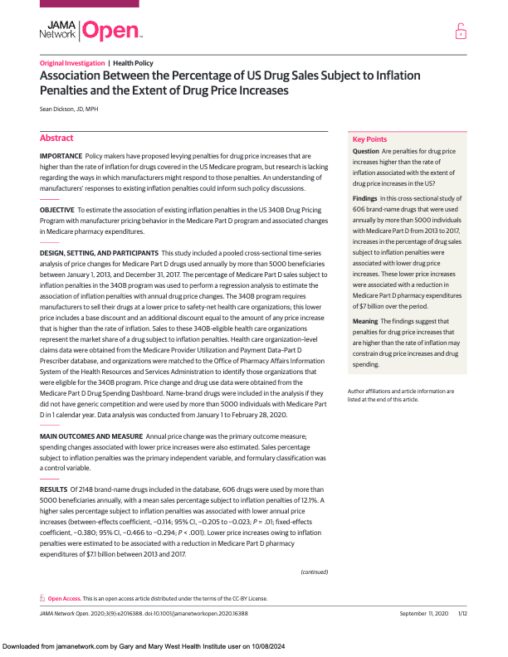Study in JAMA Network Open Examines Association Between the Percentage of US Drug Sales Subject to Inflation Penalties and the Extent of Drug Price Increases
Key Points
Question Are penalties for drug price increases higher than the rate of inflation associated with the extent of drug price increases in the US?
Findings In this cross-sectional study of 606 brand-name drugs that were used annually by more than 5000 individuals with Medicare Part D from 2013 to 2017, increases in the percentage of drug sales subject to inflation penalties were associated with lower drug price increases. These lower price increases were associated with a reduction in Medicare Part D pharmacy expenditures of $7 billion over the period.
Meaning The findings suggest that penalties for drug price increases that are higher than the rate of inflation may constrain drug price increases and drug spending.
Abstract
Importance Policy makers have proposed levying penalties for drug price increases that are higher than the rate of inflation for drugs covered in the US Medicare program, but research is lacking regarding the ways in which manufacturers might respond to those penalties. An understanding of manufacturers’ responses to existing inflation penalties could inform such policy discussions.
Objective To estimate the association of existing inflation penalties in the US 340B Drug Pricing Program with manufacturer pricing behavior in the Medicare Part D program and associated changes in Medicare pharmacy expenditures.
Design, Setting, and Participants This study included a pooled cross-sectional time-series analysis of price changes for Medicare Part D drugs used annually by more than 5000 beneficiaries between January 1, 2013, and December 31, 2017. The percentage of Medicare Part D sales subject to inflation penalties in the 340B program was used to perform a regression analysis to estimate the association of inflation penalties with annual drug price changes. The 340B program requires manufacturers to sell their drugs at a lower price to safety-net health care organizations; this lower price includes a base discount and an additional discount equal to the amount of any price increase that is higher than the rate of inflation. Sales to these 340B-eligible health care organizations represent the market share of a drug subject to inflation penalties. Health care organization–level claims data were obtained from the Medicare Provider Utilization and Payment Data–Part D Prescriber database, and organizations were matched to the Office of Pharmacy Affairs Information System of the Health Resources and Services Administration to identify those organizations that were eligible for the 340B program. Price change and drug use data were obtained from the Medicare Part D Drug Spending Dashboard. Name-brand drugs were included in the analysis if they did not have generic competition and were used by more than 5000 individuals with Medicare Part D in 1 calendar year. Data analysis was conducted from January 1 to February 28, 2020.
Main Outcomes and Measure Annual price change was the primary outcome measure; spending changes associated with lower price increases were also estimated. Sales percentage subject to inflation penalties was the primary independent variable, and formulary classification was a control variable.
Results Of 2148 brand-name drugs included in the database, 606 drugs were used by more than 5000 beneficiaries annually, with a mean sales percentage subject to inflation penalties of 12.1%. A higher sales percentage subject to inflation penalties was associated with lower annual price increases (between-effects coefficient, −0.114; 95% CI, −0.205 to −0.023; P = .01; fixed-effects coefficient, −0.380; 95% CI, −0.466 to −0.294; P < .001). Lower price increases owing to inflation penalties were estimated to be associated with a reduction in Medicare Part D pharmacy expenditures of $7.1 billion between 2013 and 2017.
Conclusions and Relevance In this cross-sectional study, increases in the percentage of drug sales subject to inflation penalties were associated with lower annual price increases. Broader application of inflation penalties may help to reduce drug price increases and decrease overall drug spending.



